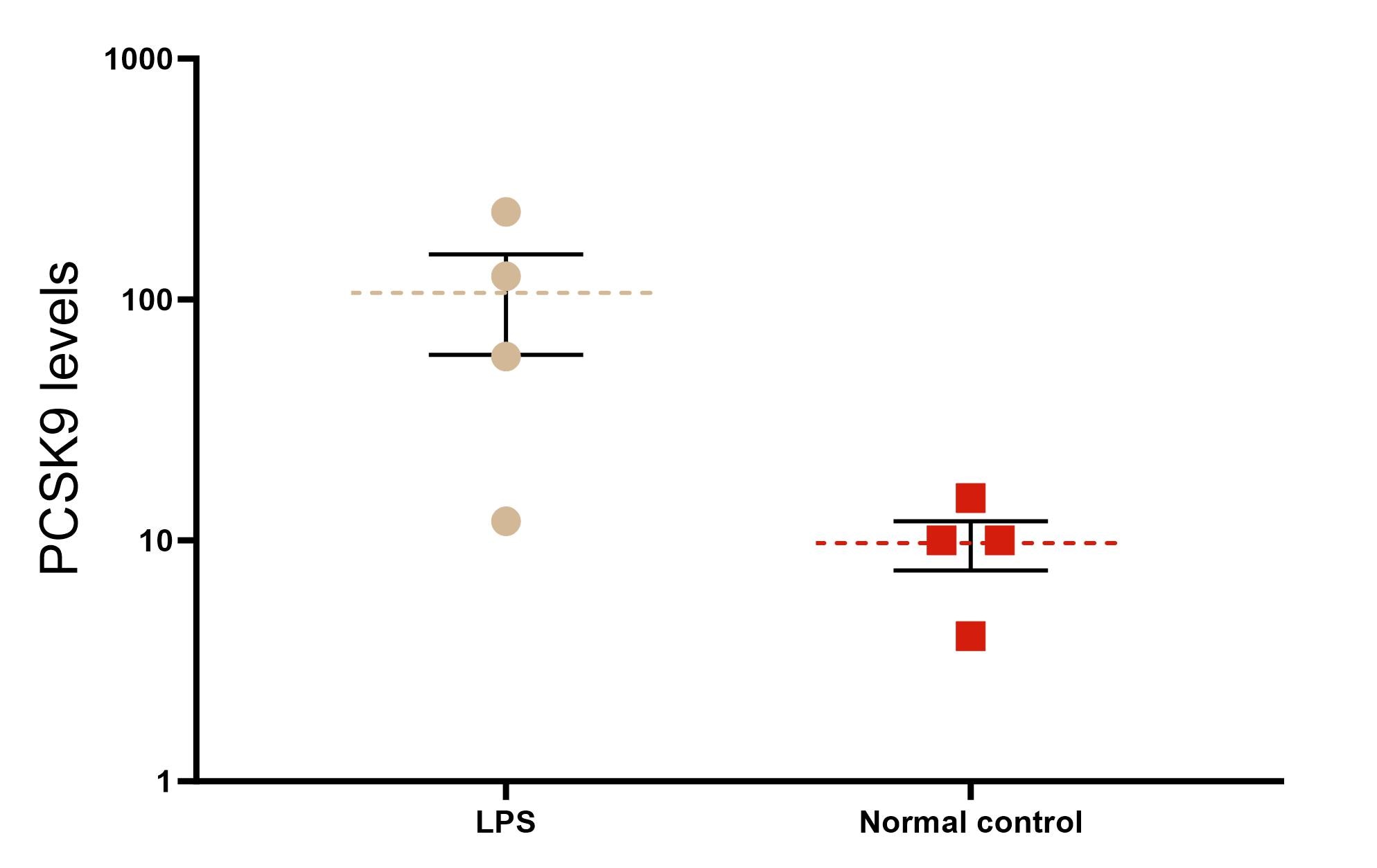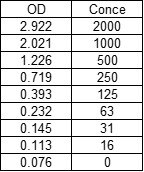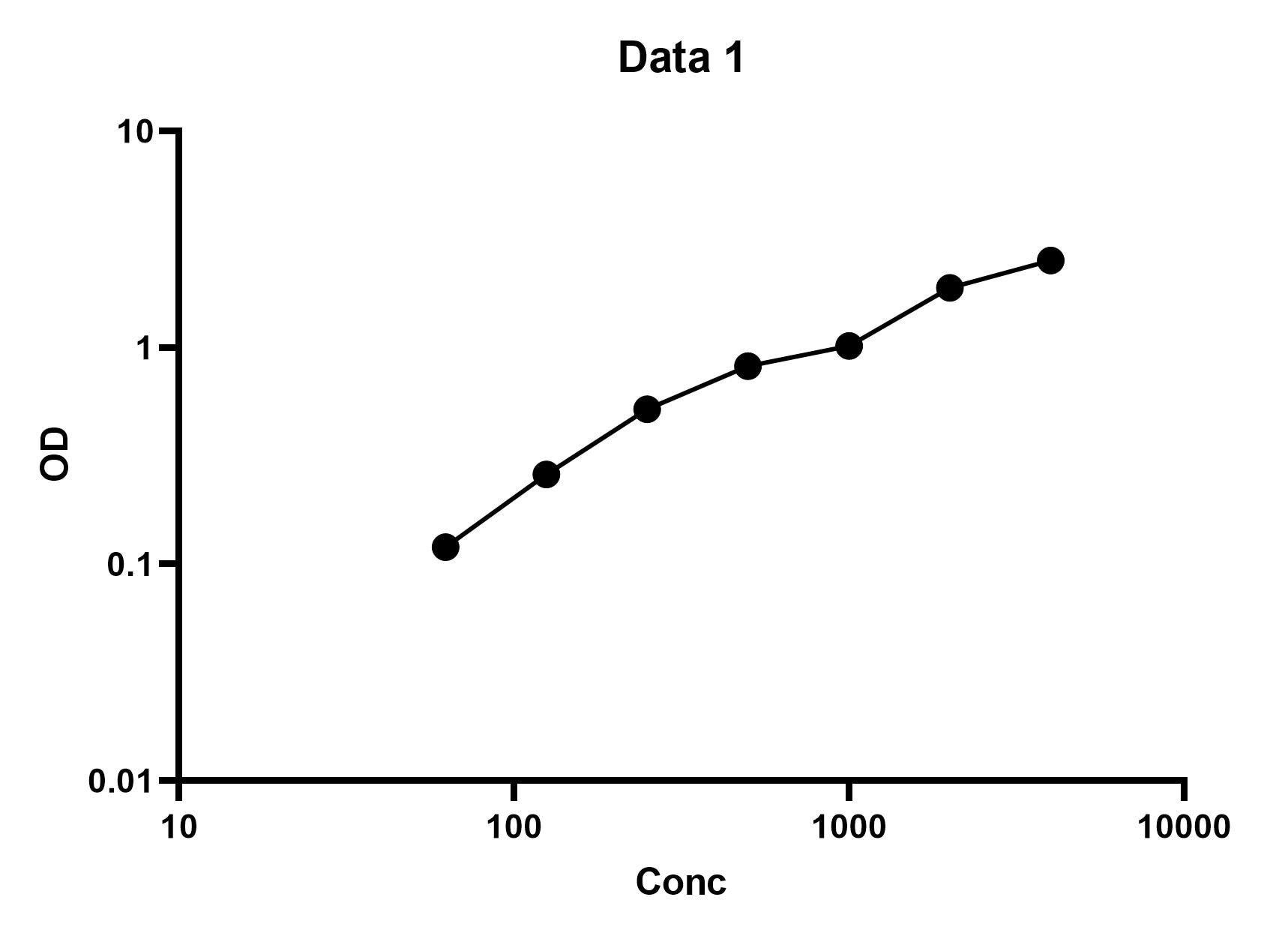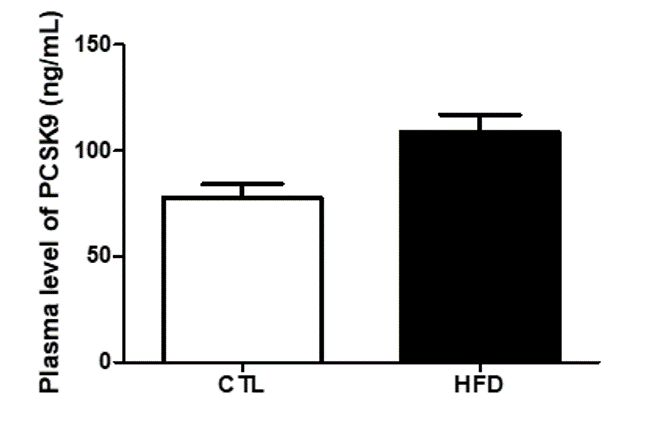Mouse Proprotein Convertase 9/PCSK9 Quantikine ELISA Kit
Mouse Proprotein Convertase 9/PCSK9 Quantikine ELISA Kit Summary
Sample Values
| Sample Type | Mean (ng/mL) | Range (ng/mL) | Standard Deviation (ng/mL) |
| Serum (n=20) | 343 | 153-649 | 163 |
| EDTA plasma (n=20) | 337 | 166-612 | 118 |
| Heparin plasma (n=20) | 324 | 141-565 | 100 |
| Tissue Type | (pg/mL) |
| Kidney (unstimulated for 1 day) | 140 |
| Liver (unstimulated for 2 days) | 889 |
| Liver (stimulated with 1.0 mg/mL LPS for 2 days) | 899 |
Tissue Lysates - Organs from 2-3 mice were rinsed with PBS to remove excess blood, chopped into 1-2 mm pieces, homogenized with a tissue homogenizer, and 1% v/v Triton™ X-100 was added. An aliquot of each tissue lysate was removed and assayed for levels of mouse PCSK9.
| Tissue Type | (pg/mL) |
| Brain | 1741 |
| Heart | 1603 |
| Kidney | 8953 |
| Liver | 36,350 |
| Lung | 3898 |
| Spleen | 1800 |
Customers also Viewed
Product Summary
Precision
Cell Culture Supernates, Cell Lysates, Serum, EDTA Plasma, Heparin Plasma
| Intra-Assay Precision | Inter-Assay Precision | |||||
|---|---|---|---|---|---|---|
| Sample | 1 | 2 | 3 | 1 | 2 | 3 |
| n | 20 | 20 | 20 | 40 | 40 | 40 |
| Mean (pg/mL) | 181 | 427 | 1427 | 213 | 469 | 1511 |
| Standard Deviation | 10.3 | 32.1 | 44.1 | 18.9 | 25.9 | 102 |
| CV% | 5.7 | 7.5 | 3.1 | 8.9 | 5.5 | 6.8 |
Recovery
The recovery of mouse PCSK9 spiked to three levels throughout the range of the assay in various matrices was evaluated.
| Sample Type | Average % Recovery | Range % |
|---|---|---|
| Cell Culture Supernates (n=6) | 102 | 94-115 |
| Cell Lysates (n=5) | 103 | 91-117 |
Linearity
Scientific Data
Product Datasheets
Preparation and Storage
Background: Proprotein Convertase 9/PCSK9
PCSK9 (proprotein convertase subtilisin kexin 9), also called proprotein convertase 9 or NARC-1 (neural apoptosis-regulated convertase 1), is a member of the proteinase K subfamily of subtilisinrelated serine endoproteases. Mouse PCSK9 cDNA encodes 694 amino acids, including a signal peptide, a prodomain, and a catalytic domain. PCSK9 is highly expressed in the liver, intestine, and kidney. It is initially synthesized as a soluble 74 kDa precursor protein. In the endoplasmic reticulum, it undergoes autocatalytic intramolecular cleavage to generate a 14 kDa prodomain and a 60 kDa catalytic domain. While within the secretion pathway, the prodomain remains associated and functions as a chaperone for the catalytic domain (1-4). During secretion, a portion of active PCSK9 may undergo additional N-terminal proteolysis by furin or proprotein convertase 5/6A, creating an inactive 53 kDa form (5). This cleavage site is conserved between mouse and human or rat PCSK9, which share 78% or 93% amino acid sequence identity, respectively. While the 60 kDa protein is the major form, its ratio with the 53 kDa forms is variable in humans (5, 6).
Assay Procedure
Refer to the product- Prepare all reagents, standard dilutions, and samples as directed in the product insert.
- Remove excess microplate strips from the plate frame, return them to the foil pouch containing the desiccant pack, and reseal.
- Add 50 µL of Assay Diluent to each well.
- Add 50 µL of Standard, Control, or sample to each well. Cover with a plate sealer, and incubate at room temperature for 2 hours.
- Aspirate each well and wash, repeating the process 4 times for a total of 5 washes.
- Add 100 µL of Conjugate to each well. Cover with a new plate sealer, and incubate at room temperature for 2 hours.
- Aspirate and wash 5 times.
- Add 100 µL Substrate Solution to each well. Incubate at room temperature for 30 minutes. PROTECT FROM LIGHT.
- Add 100 µL of Stop Solution to each well. Read at 450 nm within 30 minutes. Set wavelength correction to 540 nm or 570 nm.
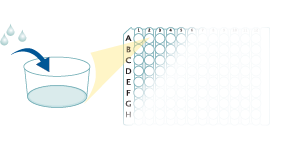


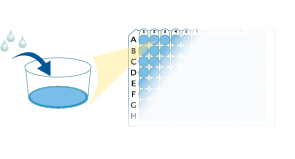
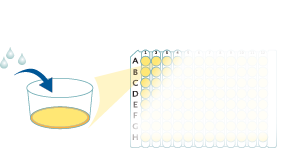
Citations for Mouse Proprotein Convertase 9/PCSK9 Quantikine ELISA Kit
R&D Systems personnel manually curate a database that contains references using R&D Systems products. The data collected includes not only links to publications in PubMed, but also provides information about sample types, species, and experimental conditions.
30
Citations: Showing 1 - 10
Filter your results:
Filter by:
-
Durable and efficient gene silencing in vivo by hit-and-run epigenome editing
Authors: Cappelluti, MA;Mollica Poeta, V;Valsoni, S;Quarato, P;Merlin, S;Merelli, I;Lombardo, A;
Nature
Species: Mouse
Sample Types: Plasma
-
Integrated compact regulators of protein activity enable control of signaling pathways and genome-editing in vivo
Authors: Franko, N;da Silva Santinha, AJ;Xue, S;Zhao, H;Charpin-El Hamri, G;Platt, RJ;Teixeira, AP;Fussenegger, M;
Cell discovery
Species: Mouse
Sample Types: Serum
-
Design and application of the transformer base editor in mammalian cells and mice
Authors: Han, W;Gao, BQ;Zhu, J;He, Z;Li, J;Yang, L;Chen, J;
Nature protocols
Species: Transgenic Mouse
Sample Types: Serum
-
Continuous directed evolution of a compact CjCas9 variant with broad PAM compatibility
Authors: Schmidheini, L;Mathis, N;Marquart, KF;Rothgangl, T;Kissling, L;Böck, D;Chanez, C;Wang, JP;Jinek, M;Schwank, G;
Nature chemical biology
Species: Mouse
Sample Types: Tissue Homogenates
-
A Type II-B Cas9 nuclease with minimized off-targets and reduced chromosomal translocations in vivo
Authors: Bestas, B;Wimberger, S;Degtev, D;Madsen, A;Rottner, AK;Karlsson, F;Naumenko, S;Callahan, M;Touza, JL;Francescatto, M;Möller, CI;Badertscher, L;Li, S;Cerboni, S;Selfjord, N;Ericson, E;Gordon, E;Firth, M;Chylinski, K;Taheri-Ghahfarokhi, A;Bohlooly-Y, M;Snowden, M;Pangalos, M;Nuttall, B;Akcakaya, P;Sienski, G;Maresca, M;
Nature communications
Species: Mouse
Sample Types: Plasma
-
High-fidelity Cas13 variants for targeted RNA degradation with minimal collateral effects
Authors: Tong, H;Huang, J;Xiao, Q;He, B;Dong, X;Liu, Y;Yang, X;Han, D;Wang, Z;Wang, X;Ying, W;Zhang, R;Wei, Y;Xu, C;Zhou, Y;Li, Y;Cai, M;Wang, Q;Xue, M;Li, G;Fang, K;Zhang, H;Yang, H;
Nature biotechnology
Species: Mouse
Sample Types: Serum
-
A cVLP-Based Vaccine Displaying Full-Length PCSK9 Elicits a Higher Reduction in Plasma PCSK9 Than Similar Peptide-Based cVLP Vaccines
Authors: L Goksøyr, M Skrzypczak, M Sampson, MA Nielsen, A Salanti, TG Theander, AT Remaley, WA De Jongh, AF Sander
Vaccines, 2022-12-20;11(1):.
Species: Mouse
Sample Types: Plasma
-
Rosa26-LSL-dCas9-VPR: a versatile mouse model for tissue specific and simultaneous activation of multiple genes for drug discovery
Authors: D Pakalnišky, T Schönberge, B Strobel, B Stierstorf, T Lamla, M Schuler, M Lenter
Scientific Reports, 2022-11-10;12(1):19268.
Species: Transgenic Mouse
Sample Types: Plasma
-
A multienzyme S-nitrosylation cascade regulates cholesterol homeostasis
Authors: CT Stomberski, NM Venetos, HL Zhou, Z Qian, BR Collison, SJ Field, RT Premont, JS Stamler
Cell Reports, 2022-10-25;41(4):111538.
Species: Mouse
Sample Types: Serum
-
Diverse Effects of Cilostazol on Proprotein Convertase Subtilisin/Kexin Type 9 between Obesity and Non-Obesity
Authors: PW Chen, SY Tseng, HY Chang, CH Lee, TH Chao
International Journal of Molecular Sciences, 2022-08-29;23(17):.
Species: Mouse
Sample Types: Serum
-
Caffeine blocks SREBP2-induced hepatic PCSK9 expression to enhance LDLR-mediated cholesterol clearance
Authors: PF Lebeau, JH Byun, K Platko, P Saliba, M Sguazzin, ME MacDonald, G Paré, GR Steinberg, LJ Janssen, SA Igdoura, MA Tarnopolsk, SR Wayne Chen, NG Seidah, J Magolan, RC Austin
Nature Communications, 2022-02-09;13(1):770.
Species: Mouse
Sample Types: Cell Culture Supernates
-
Engineered red blood cells carrying PCSK9 inhibitors persistently lower LDL and prevent obesity
Authors: R Deshycka, V Sudaryo, NJ Huang, Y Xie, LY Smeding, MK Choi, HL Ploegh, HF Lodish, N Pishesha
PLoS ONE, 2021-11-03;16(11):e0259353.
Species: Mouse
Sample Types: Plasma
-
In vivo adenine base editing of PCSK9 in macaques reduces LDL cholesterol levels
Authors: T Rothgangl, MK Dennis, PJC Lin, R Oka, D Witzigmann, L Villiger, W Qi, M Hruzova, L Kissling, D Lenggenhag, C Borrelli, S Egli, N Frey, N Bakker, JA Walker, AP Kadina, DV Victorov, M Pacesa, S Kreutzer, Z Kontarakis, A Moor, M Jinek, D Weissman, M Stoffel, R van Boxtel, K Holden, N Pardi, B Thöny, J Häberle, YK Tam, SC Semple, G Schwank
Nature Biotechnology, 2021-05-19;0(0):.
Species: Mouse
Sample Types: Cell Culture Supernates
-
Eliminating base-editor-induced genome-wide and transcriptome-wide off-target mutations
Authors: L Wang, W Xue, H Zhang, R Gao, H Qiu, J Wei, L Zhou, YN Lei, X Wu, X Li, C Liu, J Wu, Q Chen, H Ma, X Huang, C Cai, Y Zhang, B Yang, H Yin, L Yang, J Chen
Nature Cell Biology, 2021-05-10;23(5):552-563.
Species: Mouse
Sample Types: Serum
-
Genetic deletion of Abcc6 disturbs cholesterol homeostasis in mice
Authors: B Ibold, J Tiemann, I Faust, U Ceglarek, J Dittrich, TGMF Gorgels, AAB Bergen, O Vanakker, M Van Gils, C Knabbe, D Hendig
Scientific Reports, 2021-01-22;11(1):2137.
Species: Mouse
Sample Types: Serum
-
Optimization of S.�aureus dCas9 and CRISPRi Elements for a Single Adeno-Associated Virus that Targets an Endogenous Gene
Authors: JR Backstrom, J Sheng, MC Wang, A Bernardo-C, TS Rex
Mol Ther Methods Clin Dev, 2020-09-06;19(0):139-148.
Species: Mouse
Sample Types: Cell Culture Supernates
-
Synthetic immunomodulation with a CRISPR super-repressor in vivo
Authors: F Moghadam, R LeGraw, JJ Velazquez, NC Yeo, C Xu, J Park, A Chavez, MR Ebrahimkha, S Kiani
Nat. Cell Biol., 2020-09-03;22(9):1143-1154.
Species: Mouse
Sample Types: Plasma
-
In vivo genome and base editing of a human PCSK9 knock-in hypercholesterolemic mouse model
Authors: A Carreras, LS Pane, R Nitsch, K Madeyski-B, M Porritt, P Akcakaya, A Taheri-Gha, E Ericson, M Bjursell, M Perez-Alca, F Seeliger, M Althage, R Knöll, R Hicks, LM Mayr, R Perkins, D Lindén, J Borén, M Bohlooly-Y, M Maresca
BMC Biol., 2019-01-15;17(1):4.
Species: Mouse
Sample Types: Plasma
-
In utero CRISPR-mediated therapeutic editing of metabolic genes
Authors: AC Rossidis, JD Stratigis, AC Chadwick, HA Hartman, NJ Ahn, H Li, K Singh, BE Coons, L Li, W Lv, PW Zoltick, D Alapati, W Zacharias, R Jain, EE Morrisey, K Musunuru, WH Peranteau
Nat. Med., 2018-10-08;24(10):1513-1518.
Species: Mouse
Sample Types: Plasma
-
In vivo CRISPR editing with no detectable genome-wide off-target mutations
Authors: P Akcakaya, ML Bobbin, JA Guo, J Malagon-Lo, K Clement, SP Garcia, MD Fellows, MJ Porritt, MA Firth, A Carreras, T Baccega, F Seeliger, M Bjursell, SQ Tsai, NT Nguyen, R Nitsch, LM Mayr, L Pinello, M Bohlooly-Y, MJ Aryee, M Maresca, JK Joung
Nature, 2018-09-12;0(0):.
Species: Mouse
Sample Types: Plasma
-
RNA-guided transcriptional silencing in vivo with S. aureus CRISPR-Cas9 repressors
Authors: PI Thakore, JB Kwon, CE Nelson, DC Rouse, MP Gemberling, ML Oliver, CA Gersbach
Nat Commun, 2018-04-26;9(1):1674.
Species: Mouse
Sample Types: Serum
-
Reduced Blood Lipid Levels With In Vivo CRISPR-Cas9 Base Editing of ANGPTL3
Authors: AC Chadwick, NH Evitt, W Lv, K Musunuru
Circulation, 2018-02-27;137(9):975-977.
Species: Mouse
Sample Types: Plasma
-
Generation and Characterization of a Novel Small Biologic Alternative to Proprotein Convertase Subtilisin/Kexin Type 9 (PCSK9) Antibodies, DS-9001a, Albumin Binding Domain-Fused Anticalin Protein
Authors: Y Masuda, S Yamaguchi, C Suzuki, T Aburatani, Y Nagano, R Miyauchi, E Suzuki, N Yamamura, K Nagatomo, H Ishihara, K Okuno, F Nara, G Matschiner, R Hashimoto, T Takahashi, T Nishizawa
J. Pharmacol. Exp. Ther., 2018-02-20;365(2):368-378.
Species: Mouse
Sample Types: Plasma
-
Development of vaccine for dyslipidemia targeted to a proprotein convertase subtilisin/kexin type 9 (PCSK9) epitope in mice
Authors: R Kawakami, Y Nozato, H Nakagami, Y Ikeda, M Shimamura, S Yoshida, J Sun, T Kawano, Y Takami, T Noma, H Rakugi, T Minamino, R Morishita
PLoS ONE, 2018-02-13;13(2):e0191895.
Species: Mouse
Sample Types: Plasma
-
Dynamin-Related Protein 1 Inhibition Attenuates Cardiovascular Calcification in the Presence of Oxidative Stress
Authors: M Rogers, N Maldonado-, JD Hutcheson, C Goettsch, S Goto, I Yamada, T Faits, H Sesaki, M Aikawa, E Aikawa
Circ. Res., 2017-06-12;0(0):.
Species: Mouse
Sample Types: Serum
-
Regulation of lipid metabolism by obeticholic acid in hyperlipidemic hamsters
Authors: Bin Dong
J. Lipid Res, 2016-12-09;0(0):.
Species: Hamster
Sample Types: Serum
-
Endoplasmic reticulum stress and Ca2+ depletion differentially modulate the sterol-regulatory protein PCSK9 to control lipid metabolism
Authors: Paul Lebeau
J. Biol. Chem, 2016-12-01;0(0):.
Species: Mouse
Sample Types: Plasma
-
Reduction of circulating PCSK9 and LDL-C levels by liver-specific knockdown of HNF1alpha in normolipidemic mice.
Authors: Shende V, Wu M, Singh A, Dong B, Kan C, Liu J
J Lipid Res, 2015-02-04;56(4):801-9.
Species: Mouse
Sample Types: Serum
-
Inhibition of PCSK9 transcription by berberine involves down-regulation of hepatic HNF1alpha protein expression through the ubiquitin-proteasome degradation pathway.
Authors: Dong B, Li H, Singh A, Cao A, Liu J
J Biol Chem, 2014-12-24;290(7):4047-58.
Species: Hamster, Mouse
Sample Types: Serum
-
Permanent alteration of PCSK9 with in vivo CRISPR-Cas9 genome editing.
Authors: Ding Q, Strong A, Patel K, Ng S, Gosis B, Regan S, Cowan C, Rader D, Musunuru K
Circ Res, 2014-06-10;115(5):488-92.
Species: Mouse
Sample Types: Plasma
FAQs
No product specific FAQs exist for this product, however you may
View all ELISA FAQsSupplemental ELISA Products
Reviews for Mouse Proprotein Convertase 9/PCSK9 Quantikine ELISA Kit
Average Rating: 4.6 (Based on 8 Reviews)
Have you used Mouse Proprotein Convertase 9/PCSK9 Quantikine ELISA Kit?
Submit a review and receive an Amazon gift card.
$25/€18/£15/$25CAN/¥75 Yuan/¥2500 Yen for a review with an image
$10/€7/£6/$10 CAD/¥70 Yuan/¥1110 Yen for a review without an image
Filter by:
stable kit











